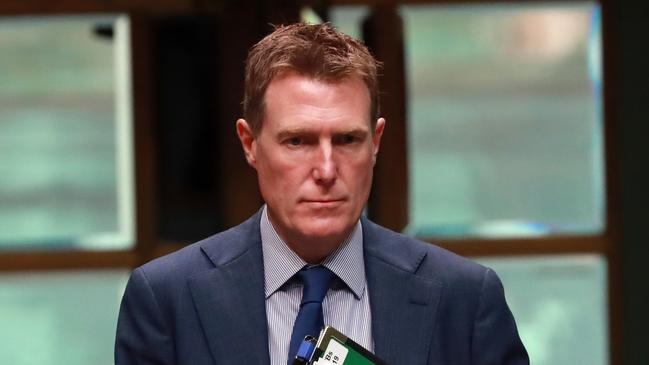Faith based schools and groups fear loss of charity status
Faith-based schools and groups have warned their charitable status could be stripped under a “public benefit” test over traditional marriage and gender belief.

Faith-based schools and groups have warned their charitable status could be stripped under a “public benefit” test over traditional marriage and gender beliefs, as pressure builds for Attorney-General Christian Porter to expand his religious freedoms package.
Ahead of an address to the National Press Club on Wednesday, Mr Porter will stare down pressure from leading Christian and Jewish groups who are calling for a wider overhaul of the Charities Act to protect against legal challenges.
Mr Porter will outline the complexity in drafting the religious bills amid competing interests of faith-based, business and social groups in his speech and is expected to provide detail on his finalised package ahead of tabling the bills in parliament before December 5.
The updated religious discrimination bill will include protections for faith-based hospitals and aged care facilities.
Clause 4 of Mr Porter’s draft Human Rights Legislation Amendment (Freedom of Religion) Bill ensures supporting a traditional view of marriage will not be a “disqualifying purpose” that would preclude an organisation from remaining a charity under the Act.
While Mr Porter, who has declared he will not make wholesale changes to his religious freedoms package, has committed to amending the Charities Act, he is unlikely to expand changes to the public benefit test.
The Australian can reveal Scott Morrison, a devout Christian who abstained from voting on the same-sex marriage bill, attempted to move marriage amendments in 2017 supporting greater protection for charities to ensure they were not disqualified over marriage and religious beliefs.
An explanatory memorandum examining concerns over the public benefit requirement flagged potential issues for religious charities following the legalisation of same-sex marriage.
Mr Porter’s resistance to expanding changes to the Charities Act comes despite a New Zealand case which saw Christian lobby group Family First stripped of its charitable status over its traditional view of marriage.
In August last year, after years of legal challenges, the New Zealand High Court upheld a decision by the Charities Registration Board to strip the group of its charitable status.
Justice Simon France determined Family First’s agenda was not charitable or in the public interest: “The board considers Family Firsthas a purpose to promote its own particular views about marriage and the traditional family that cannot be determined to be for the public benefit in a way previously accepted as charitable.”
Mr Porter said the Ruddock review had “considered the Family First matter in New Zealand and whether further protections were needed for religious charities”.
“The review did not draw any conclusions from those overseas cases because they were decided on the basis of different laws and very specific facts,” Mr Porter told The Australian.
“However, the review did recommend Australian charities laws be amended to make clear that advocating for ‘traditional’ marriage does not disqualify a body from being a charity. The government accepted that recommendation, and will now follow through on its commitment.”
Mr Porter said the Ruddock review had “carefully considered whether the ‘public benefit’ elements of the Charities Act needed to be amended”.
“The review expressly said it did not consider religious charities were ‘at risk of losing their charitable status under Australian law’, and recommended changes to section 11 of the Charities Act to clarify the legal position,” he said.
“The Australian Charities and Not-for-profit Commission has since made clear that further doubts about the operation of the Charities Act can be addressed by separate guidance, to provide the required level of certainty.”
ACNC Commissioner Gary Johns raised concern changes to the Charities Act, in relation to disqualification of organisations, could “set a precedent”. Dr Johns said groups attempting to seek clarity “around what does or does not constitute a disqualifying purpose may seek to have a subclause inserted into the Charities Act”.
The Australian Association of Christian Schools said other common law countries had removed the “tax exemption status of charities that advocated for a traditional view of marriage and sexuality arguing they did not meet the ‘public benefit’ requirement”.
In its submission, they warned charities who hold a “biological view on gender or other socially conservative views on other topics may be vulnerable”.
“We are concerned that the international examples create a dangerous precedent, and to fulfil the spirit of the current bill, Section 6 (of the Human Rights Legislation Amendment Bill) must be amended,” the submission said.
The Australian Catholic Bishops Conference also called for the Charities Act to be amended to ensure advocacy for marriage does “not contravene the public benefits test”.
Executive Council of Australian Jewry co-chief executive Peter Wertheim said despite toughening disqualification criteria, charities must also meet the “additional requirement of providing a ‘public benefit’”.
“The HRLA Bill leaves open the possibility that a charity may lose its status as such by reason of promoting its traditional view of marriage, because a court interpreting this common law test may hold that promoting a traditional view of marriage does not confer a ‘public benefit’,” Mr Wertheim said in his submission.
“Accordingly an additional provision is needed to the effect that the promotion of a traditional view of marriage will not result in a currently-registered charity losing its charitable status by reason of the ‘public benefit’ test in sections 5 and 6 of the Charities Act.”




To join the conversation, please log in. Don't have an account? Register
Join the conversation, you are commenting as Logout